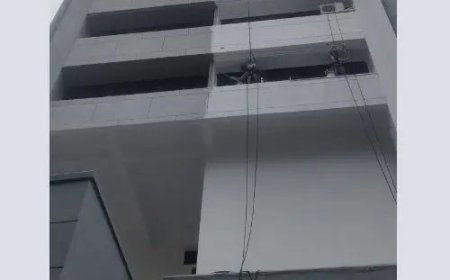Understanding Your Rights as a Tenant: A Guide to Housing Disrepair Claims in the UK

Tenants across the UK have the legal right to live in homes that are safe, structurally sound, and free from health hazards. Unfortunately, many renters find themselves in situations where their landlords fail to maintain the propertyleaving them to deal with issues like mould, damp, broken heating systems, pest infestations, or unsafe living conditions. These are more than just inconveniences; they are breaches of your rights as a tenant.
If youre facing these issues, seeking help from the housing disrepair team UK is one of the most effective ways to protect your interests. With experience in supporting tenants and pursuing landlords who neglect their duties, this team helps ensure that renters across the country get the compensation and repairs theyre entitled to under the law.
What Is Housing Disrepair?
Housing disrepair refers to conditions in a rented home that have deteriorated due to lack of maintenance or repair. These include:
-
Structural issues such as cracked walls or ceilings
-
Leaks in the roof or plumbing system
-
Persistent damp or mould
-
Faulty heating or electrical systems
-
Damaged windows, doors, or flooring
-
Pest infestations due to property neglect
These issues are not only inconvenientthey can lead to serious health concerns, financial stress, and safety risks for tenants.
Legal Obligations of Landlords
Under UK legislation, particularly the Landlord and Tenant Act 1985 and the Homes (Fitness for Human Habitation) Act 2018, landlords must:
-
Ensure the structure and exterior of the property are in good repair
-
Maintain installations for water, heating, gas, electricity, and sanitation
-
Address any repair issues within a reasonable time after being notified
-
Keep the property free of serious hazards that may endanger tenants
Failure to comply with these obligations can lead to legal consequences, including court orders and financial penalties.
Signs You May Be Eligible for a Claim
Not all housing issues qualify for compensation, but the following are strong indicators:
-
Youve reported a problem to your landlord, but it has gone unresolved
-
The issue has lasted for weeks or months without action
-
Your health or wellbeing has been affected by the disrepair
-
Youve incurred additional costs, such as medical expenses or damaged belongings
If any of these situations apply, you could be eligible to claim compensation and request urgent repairs.
What You Can Claim For
A successful housing disrepair claim can entitle you to compensation for:
-
Pain, suffering, or illness caused by unsafe living conditions
-
Financial losses from damaged possessions
-
Increased utility bills due to faulty heating
-
Inconvenience and disruption to your daily life
-
Alternative accommodation costs, if you had to relocate temporarily
The amount awarded depends on the severity of the issue, how long it was unresolved, and how it affected your life.
The Claims Process: Step-by-Step
Making a housing disrepair claim can feel overwhelming, but with the help of the housing disrepair team UK, the process becomes straightforward:
-
Initial Assessment
The first step involves reviewing the details of your case to determine whether you have grounds for a claim. -
Evidence Gathering
This includes taking photographs, gathering communication records with your landlord, and collecting receipts for any damage-related expenses. -
Inspection
A professional may be sent to inspect your property and assess the extent of the disrepair. -
Letter of Claim
Your solicitor will formally notify the landlord of the issues and your intent to pursue legal action. -
Negotiation or Court Action
In most cases, landlords will settle to avoid court. If not, your legal team can represent you in proceedings.
This structured approach ensures that your voice is heard and your case is backed by legal expertise.
Why You Should Act Quickly
There are strict time limits when it comes to housing disrepair claims:
-
For property damage claims, the limit is typically six years
-
For personal injury claims (e.g., respiratory illness from mould), the limit is three years
Delaying action can make it harder to gather evidence or file a valid claim, so dont wait to start the process.
The Impact of Disrepair on Tenants
Housing disrepair can have wide-ranging effects, including:
-
Health Issues: Mould and damp can lead to breathing problems and skin irritation.
-
Mental Wellbeing: Living in unsafe or uncomfortable conditions can cause stress and anxiety.
-
Property Damage: Faulty structures or leaks can ruin furniture, clothing, and personal items.
-
Financial Burden: You may spend extra money on temporary fixes, heating, or replacing damaged items.
These impacts are serious, and tenants deserve both compensation and repairs to restore safe living conditions.
Benefits of Working with Housing Disrepair Experts
Choosing a team that focuses specifically on tenant claims ensures the best outcome. The housing disrepair team UK offers:
-
Specialist Legal Knowledge: Professionals who know housing law inside and out
-
No Win, No Fee Agreements: You wont pay unless your claim is successful
-
Quick Turnaround: Faster case resolution through experience and efficiency
-
Tailored Support: Personalised advice based on your specific case and needs
-
UK-Wide Service: Help for tenants across England and Wales
This type of expert representation gives tenants the power to stand up for their rightswithout the stress of navigating the legal system alone.
Take Control of Your Living Conditions Today
If youre suffering due to poor housing conditions and your landlord has failed to take action, dont suffer in silence. You are protected by the law, and help is available. By partnering with the housing disrepair Claim, you can get the compensation you deserve and ensure your home is repaired quickly and professionally.
Take the first step todayreach out for a free consultation and begin your journey toward safer, healthier living.

































